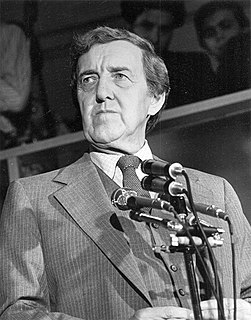A Quote by Gautama Buddha
Related Quotes
The beginning of prayer is silence. If we really want to pray we must first learn to listen, for in the silence of the heart God speaks. And to be able to see that silence, to be able to hear God we need a clean heart; for a clean heart can see God, can hear God, can listen to God; and then only from the fullness of our heart can we speak to God. But we cannot speak unless we have listened, unless we have made that connection with God in the silence of our heart.
I readily concede that a prime minister is not required to speak on every occasion or on every subject, but when there is a duty to speak, silence is unacceptable. Silence can be a strategy, silence can be a tactic, but silence can never be an answer to the ills of our polity and the fault lines of our society.
It is very hard to live with silence. The real silence is death and this is terrible. To approach this silence, it is necessary to journey to the desert. You do not go to the desert to find identity, but to loses it, to lose your personality, to be anonymous. You make yourself void. You become silence. You become more silent than the silence around you. And then something extraordinary happens: you hear silence speak.
The recent statement of your executive committee are the sentiments of my own heart and I found myself in full accord when I read its opening lines: "A time comes when silence is betrayal." That time has come for us in relation to Vietnam. Some of us who have already begun to break the silence of the night have found that the calling to speak is often a vocation of agony, but we must speak. We must speak with all the humility that is appropriate to our limited vision, but we must speak.
There are different qualities of silence. There's the silence that sustains us, as women, that nourishes us, the silence where I believe our true voice, our authentic voice, dwells. But there's also the silence that censors us, that tells us what we have to say does not want to be heard, should not be heard, has no value. And that if we speak, it will be at our own peril. This kind of silence is deadly. This kind of silence is deadening to who we are as women. And when a woman is silenced, the world is silenced. When a woman speaks, there is an opening.
For language to have meaning, there must be intervals of silence somewhere, to divide word from word and utterance from utterance. He who retires into silence does not necessarily hate language. Perhaps it is love and respect for language which imposes silence upon him. For the mercy of God is not heard in words unless it is heard, both before and after the words are spoken, in silence.
It would be erroneous to say Sohrab was quiet. Quiet is peace. Tranquility. Quiet is turning down the volume knob on life. Silence is pushing the off button. Shutting it down. All of it. Sohrab's silence wasn't the self imposed silence of those with convictions, of protesters who seek to speak their cause by not speaking at all. It was the silence of one who has taken cover in a dark place, curled up all the edges and tucked them under.
The tongue is a small member, but it does big things. A religious who does not keep silence will never attain holiness; that is, she will never become a saint. Let her not delude herself - unless it is the Spirit of God who is speaking through her, for then she must not keep silent. But, in order to hear the voice of God, one has to have silence in one's soul and to keep silence; not a gloomy silence but an interior silence; that is to say, recollection in God.
































